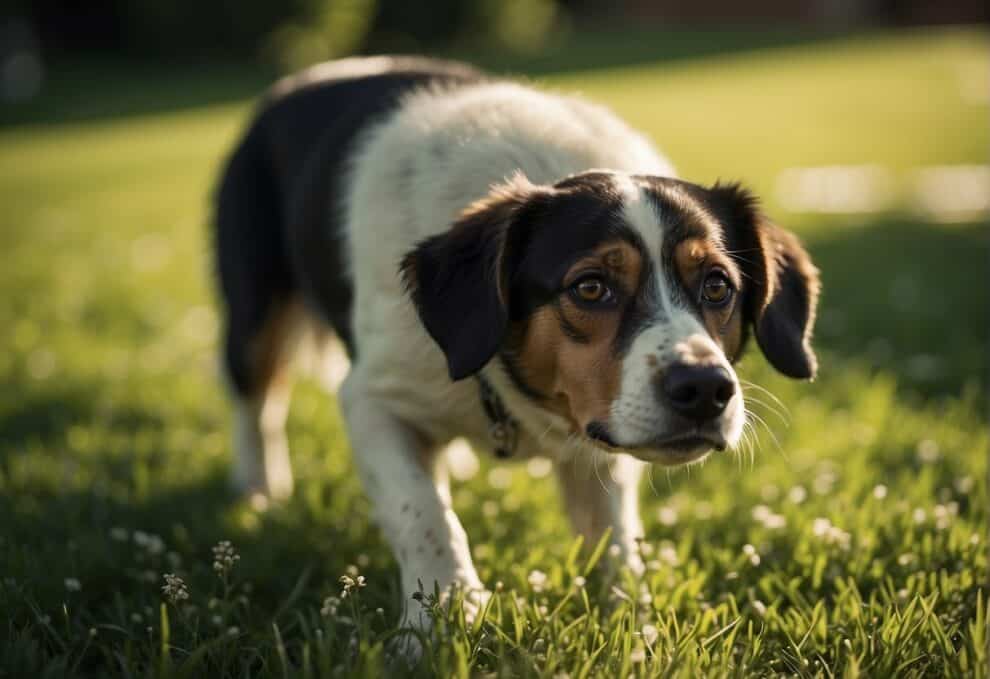I’ve often noticed that my own dog, like many others, munches on grass during our walks.
It’s a common behavior and there are several theories as to why our canine friends do this.
Some suggest that dogs may eat grass to induce vomiting when they don’t feel well, while others speculate it could be part of an instinctive behavior to add necessary fiber and nutrients to their diet.

When it comes to my own dog, there doesn’t always seem to be a clear cause for this grazing habit.
It’s not necessarily associated with an illness since he often appears perfectly healthy before and after nibbling on some greenery and eating grass doesn’t always lead to vomiting,
Though it might initially be concerning, I’ve learned that grass eating isn’t typically something to worry about.
It’s generally considered a normal behavior among dogs.
However, if a dog is eating grass and frequently vomiting or showing signs of discomfort, it’s important to consult a vet to ensure there’s not a more serious underlying issue at play.
Understanding Canine Grazing Behavior

Instinctual Behaviors in Dogs
In my opinion, instinct plays a significant role in why dogs engage in grazing.
It has been proposed by scientists that wild dogs might have consumed plant material to fulfill certain dietary needs or help with intestinal discomfort.
While domestic dogs are well-fed compared to their wild counterparts, this instinctual behavior may still be present.
Grazing might also be an inherited habit from their ancestors that serves as a means of inducing vomiting to relieve stomach upset.
Can Dogs Eat Grass out of Curiosity or Boredom?
Apart from instinct, I’ve found that dogs may also eat grass simply out of curiosity or boredom.
Younger dogs, in particular, are known to explore their environment by tasting various objects, which can include grass.
When dogs aren’t provided with adequate stimulation through playtime or walks, they may turn to grass-eating as a way to pass the time.
So I guess as a pet owner it’s my job to ensure my dog has enough mental and physical exercise to prevent such behaviors stemming from boredom.
Health and Nutrition Reasons For Eating Grass
It’s possible that when my dog eats grass, he is trying to compensate for something missing in his diet or to aid his digestion.
Grass is a Source of Fiber
Grass can serve as a source of fiber for dogs, which can be essential for their digestion.
By consuming grass, your dog may be trying to increase their fiber intake to help with bowel regularity.
An informative piece by the American Kennel Club suggests that this natural behavior might be due to the instinctive need to add fiber to their diet, which can benefit their overall digestive process.
Addressing Nutritional Deficiencies
If your dog shows a persistent interest in eating grass, they might be trying to address a nutritional deficiency.
The ingestion of grass is sometimes linked to a lack of certain nutrients, and it’s possible that a dog’s desire to eat grass could signal a deficiency in their diet.
PetMD explores the idea that dogs may eat grass to compensate for a lack of necessary elements in their food.
So as a responsible dog owner you should ensure your dog’s diet meets all their nutritional needs and consult with a veterinarian if you suspect any deficiencies.
Potential Medical Reasons For Eating Grass

Occasionally, you might notice that your dog’s grass eating could point towards an underlying medical issue.
If your furry friend is munching on grass frequently and showing signs of discomfort, it might be more than just a quirky habit.
Grass Eating Linked to Upset Stomach
When your dog eats grass, it’s important for you to observe if they’re doing this because of an upset stomach.
Vomiting sometimes occurs after grass consumption, which could indicate that your dog is trying to soothe a stomach irritation or induce vomiting to feel better.
Research mentioned by VCA Animal Hospitals shows that if a dog is eating grass and then throwing up, it might be an attempt to alleviate gastrointestinal discomfort.
When to Consult a Veterinarian
Consulting veterinarians becomes essential when your dog’s grass eating is accompanied by signs of a medical condition like frequent vomiting, diarrhea, or signs of pain and distress.
The American Kennel Club highlighted that a sudden increase in grass eating warrants a vet visit to rule out issues such as gastric reflux or inflammatory bowel disease.
Your vet can help diagnose any conditions and guide you on the proper treatment.
Safety and Risks of Grass Consumption

Grass treated with pesticides can be dangerous, so make sure the lawn hasn’t been recently treated.
If you’re in a public park, look for signs that might indicate whether pesticides have been used.
It’s also crucial for you to watch for signs of pica, which is the consumption of non-food items.
If you observe your dog eating grass compulsively or consuming other inappropriate items, see that as a red flag.
It indicates a possible nutrient deficiency or boredom, and it’s your cue to consult a vet.
Enrichment Alternatives to Grass Eating
Interactive toys, especially those that dispense treats, are a fantastic way for you to keep your dog engaged.
When you fill a puzzle toy with kibble or treats, it becomes an enticing challenge that captures your dog’s attention.
Puppies, with their boundless energy and curiosity, can also benefit greatly from such toys.
Treat Balls: As your dog rolls them around, the treats inside spill out, rewarding their effort and keeping them busy.
Puzzle Feeders: These require your dog to solve a simple puzzle to access the treats, improving their problem-solving skills.
Training Tips to Curb the Habit
If you suspect your dog eats grass out of boredom, introducing more training sessions could help.
Here’s how you can approach training to distract from grass munching:
Basic Commands: Reinforce commands like ‘sit’, ‘stay’, or ‘leave it’ to provide immediate distractions from grass.
Trick Training: Learning new tricks keeps your dog mentally sharp and focused on you, rather than the lawn.
By incorporating these enrichment strategies, you can enrich your dog’s environment, making the grass less appealing in comparison to the fun alternatives you’re providing.















